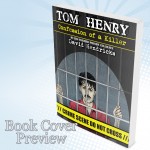I found a letter from Tom Henry in our mailbox this weekend. Here’s what he wrote:
3-21-13
David,
This date is a memorable one. Where do I begin? Let’s start on March 20th. I had a visit from Rosie and Richard (his sister and her husband). Rosie said that neither of the law students have contacted her by phone or email. So she said we’re going to drive around tonight and see if we can locate them at a motel. Rosie had their names because I sent them to her. They didn’t find them anywhere.
Thursday morning. The parole hearing was scheduled for 9:00. I was taken to North 2 Cell House around 8:20. About 9:12 I was taken to an area with a desk and a woman named Ms. Donovan put down my file and said to the officer, “we’ll be needing four more chairs.”
She asked the officer to call out to the Electric Eye and have Hillenbrand’s visitors escorted in. He made the call and said a Richard and Rosemary Anderson are on the way in. She told him there should be four visitors, and she told him the names of the two law students. “I’m not going to proceed with this hearing without Hillenbrand’s counsel,” she said. She went to the wall phone and told someone on it to hold Hillenbrand’s visitors and to ask at the Electric Eye if the two law students were signed in. “No,” was the answer.
Around 9:40 she asked me if I know of any reason or have been notified that they wouldn’t be attending. “None whatsoever,” I said. I’m upset myself but doing my darndest not to show it. She says, “We’ll give them some more time and if they don’t show I’ll continue this hearing to April’s docket.”
So she’s sitting there and I’m sitting there. I’m bored because I don’t have any activity I can do to pass the time. On the other hand, she has my jacket (thick folder with pockets) and opens it and commences reading papers and letters from the right side of it. That got my follicles to stand up under the skin on my bald spot, because the right side contains the petitions against me, letters from the state’s attorney, and letters of protest.
The only view I had was her facial expressions as she read one after another. She was very professional and didn’t comment about them. I’m thinking of all the negative things she’s reading, but I know when she reads the stuff on the left side it will change her thoughts somewhat about the inmate sitting across from her. She closes the folder and diverts her attention back to calling on the phone to inquire about the law students, if by chance they might have called.
She’s standing after getting off the phone talking to the security officer. All this time while I’m sitting there officers and counselors are going back and forth behind me. Some know her and are talking to her, but the distance is far enough I can’t make out that they’re saying.
She returns and sits down and says she’s been to Starved Rock, that she interviewed Chuck Weger at a parole hearing, and before she presented her case to the other members at the en banc hearing she drove to Starved Rock and, using the book, went into the lodge where he worked as a cook and then walked down the trail and went inside the cave where the three women were raped and killed.
She was a defense lawyer and doesn’t use a tape recorder. She takes notes using shorthand. She said she enjoyed doing a lot of her own investigative work. She wants to feel whatever decision she makes when she votes that it is the right one. “I have a responsibility and I take it seriously,” she said. Then she said she read the two C-number prisoners’ books. “I’m an avid reader,” she said. I said, “that way you get the whole picture of things. I seen you reading all those letters in the right side of the folder. I’m waiting for you to read the ones on the left.” She assured me she knows what’s in there and will be going over them.
So more time elapsed and she says, “there’s never been a time that any of Alan Mills’ students never showed up and didn’t even call, like today. I myself can’t contact them. It’s up to you to find out why. I’ll continue this to next month’s docket. It won’t be me, ‘cause I’m not scheduled to come to Menard in April.”
Then she said, “Henry, there’s been mention about a book that’s been written about you. I will be reading it.”
“Miss Donavan,” I said, “I don’t know what kind of grade these law students are getting this semester, but I’m giving them an “F”. They failed me by not calling me after our visit here, not contacting my sister or calling down here letting us know they’re not coming. You know when you’re in court if you feel like your lawyer’s not doing a good job you can just fire him? Is there some paper we can draw up here to make a record that I no longer want their assistance?
“It’s up to you alone to make that choice,” she said.
“Let’s start writing,” I said. (I figure if I get it postponed till next month there’ll be another parole board member here. Ms. Donavan has already read everything in my jacket. She’s been waiting all this time to do her job. Plus, I’m not letting someone who was a defense lawyer get away and possibly get an ex-state’s attorney.)
She instructed the officer to have my visitors escorted in. They came in and we had the hearing. At the conclusion she said to Rosie, “I want to get to the bottom of why those law students didn’t attend.” She gave Rosie her business card and said, “when you contact them and find out, let me know.” Then she closed the file and turned to me and said, “I’ll be reading Tom Henry soon.”
Thank you for viewing my blog. Please return often. I value your comments.
Regards,
David Hendricks


